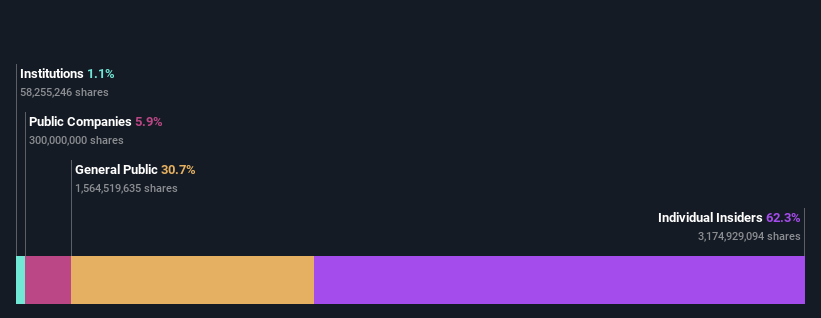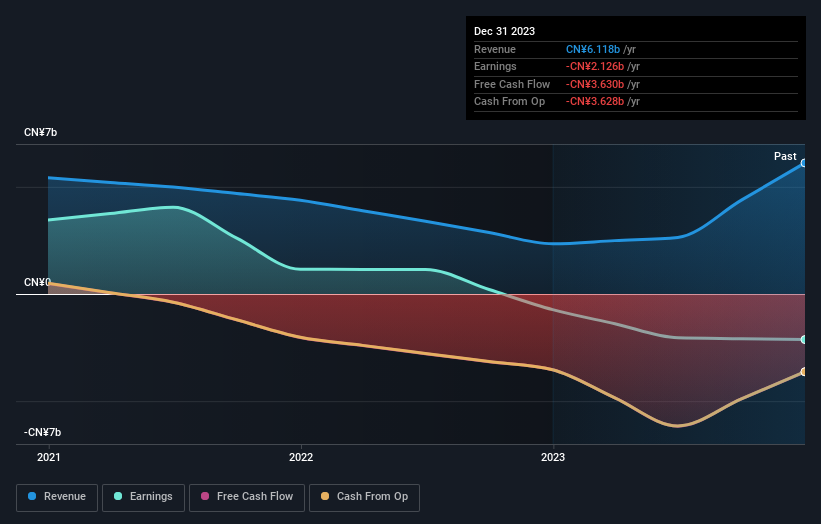- Hong Kong
- /
- Real Estate
- /
- SEHK:95
Insiders are the top stockholders in LVGEM (China) Real Estate Investment Company Limited (HKG:95), and the recent 11% drop might have disappointed them

Key Insights
- Insiders appear to have a vested interest in LVGEM (China) Real Estate Investment's growth, as seen by their sizeable ownership
- 62% of the company is held by a single shareholder (Hong King Wong)
- Ownership research, combined with past performance data can help provide a good understanding of opportunities in a stock
To get a sense of who is truly in control of LVGEM (China) Real Estate Investment Company Limited (HKG:95), it is important to understand the ownership structure of the business. We can see that individual insiders own the lion's share in the company with 62% ownership. Put another way, the group faces the maximum upside potential (or downside risk).
As a result, insiders as a group endured the highest losses after market cap fell by HK$306m.
In the chart below, we zoom in on the different ownership groups of LVGEM (China) Real Estate Investment.
See our latest analysis for LVGEM (China) Real Estate Investment

What Does The Institutional Ownership Tell Us About LVGEM (China) Real Estate Investment?
Institutions typically measure themselves against a benchmark when reporting to their own investors, so they often become more enthusiastic about a stock once it's included in a major index. We would expect most companies to have some institutions on the register, especially if they are growing.
Less than 5% of LVGEM (China) Real Estate Investment is held by institutional investors. This suggests that some funds have the company in their sights, but many have not yet bought shares in it. If the company is growing earnings, that may indicate that it is just beginning to catch the attention of these deep-pocketed investors. It is not uncommon to see a big share price rise if multiple institutional investors are trying to buy into a stock at the same time. So check out the historic earnings trajectory, below, but keep in mind it's the future that counts most.

Hedge funds don't have many shares in LVGEM (China) Real Estate Investment. Hong King Wong is currently the largest shareholder, with 62% of shares outstanding. With such a huge stake in the ownership, we infer that they have significant control of the future of the company. For context, the second largest shareholder holds about 5.9% of the shares outstanding, followed by an ownership of 1.0% by the third-largest shareholder.
Researching institutional ownership is a good way to gauge and filter a stock's expected performance. The same can be achieved by studying analyst sentiments. As far as we can tell there isn't analyst coverage of the company, so it is probably flying under the radar.
Insider Ownership Of LVGEM (China) Real Estate Investment
The definition of company insiders can be subjective and does vary between jurisdictions. Our data reflects individual insiders, capturing board members at the very least. Management ultimately answers to the board. However, it is not uncommon for managers to be executive board members, especially if they are a founder or the CEO.
Most consider insider ownership a positive because it can indicate the board is well aligned with other shareholders. However, on some occasions too much power is concentrated within this group.
Our most recent data indicates that insiders own the majority of LVGEM (China) Real Estate Investment Company Limited. This means they can collectively make decisions for the company. Given it has a market cap of HK$2.5b, that means they have HK$1.6b worth of shares. Most would be pleased to see the board is investing alongside them. You may wish todiscover (for free) if they have been buying or selling.
General Public Ownership
The general public, who are usually individual investors, hold a 31% stake in LVGEM (China) Real Estate Investment. While this group can't necessarily call the shots, it can certainly have a real influence on how the company is run.
Public Company Ownership
It appears to us that public companies own 5.9% of LVGEM (China) Real Estate Investment. This may be a strategic interest and the two companies may have related business interests. It could be that they have de-merged. This holding is probably worth investigating further.
Next Steps:
It's always worth thinking about the different groups who own shares in a company. But to understand LVGEM (China) Real Estate Investment better, we need to consider many other factors. Case in point: We've spotted 2 warning signs for LVGEM (China) Real Estate Investment you should be aware of.
Of course this may not be the best stock to buy. Therefore, you may wish to see our free collection of interesting prospects boasting favorable financials.
NB: Figures in this article are calculated using data from the last twelve months, which refer to the 12-month period ending on the last date of the month the financial statement is dated. This may not be consistent with full year annual report figures.
New: AI Stock Screener & Alerts
Our new AI Stock Screener scans the market every day to uncover opportunities.
• Dividend Powerhouses (3%+ Yield)
• Undervalued Small Caps with Insider Buying
• High growth Tech and AI Companies
Or build your own from over 50 metrics.
Have feedback on this article? Concerned about the content? Get in touch with us directly. Alternatively, email editorial-team (at) simplywallst.com.
This article by Simply Wall St is general in nature. We provide commentary based on historical data and analyst forecasts only using an unbiased methodology and our articles are not intended to be financial advice. It does not constitute a recommendation to buy or sell any stock, and does not take account of your objectives, or your financial situation. We aim to bring you long-term focused analysis driven by fundamental data. Note that our analysis may not factor in the latest price-sensitive company announcements or qualitative material. Simply Wall St has no position in any stocks mentioned.
Have feedback on this article? Concerned about the content? Get in touch with us directly. Alternatively, email editorial-team@simplywallst.com
About SEHK:95
LVGEM (China) Real Estate Investment
An investment holding company, engages in property development and investment businesses in the People’s Republic of China.
Mediocre balance sheet very low.

